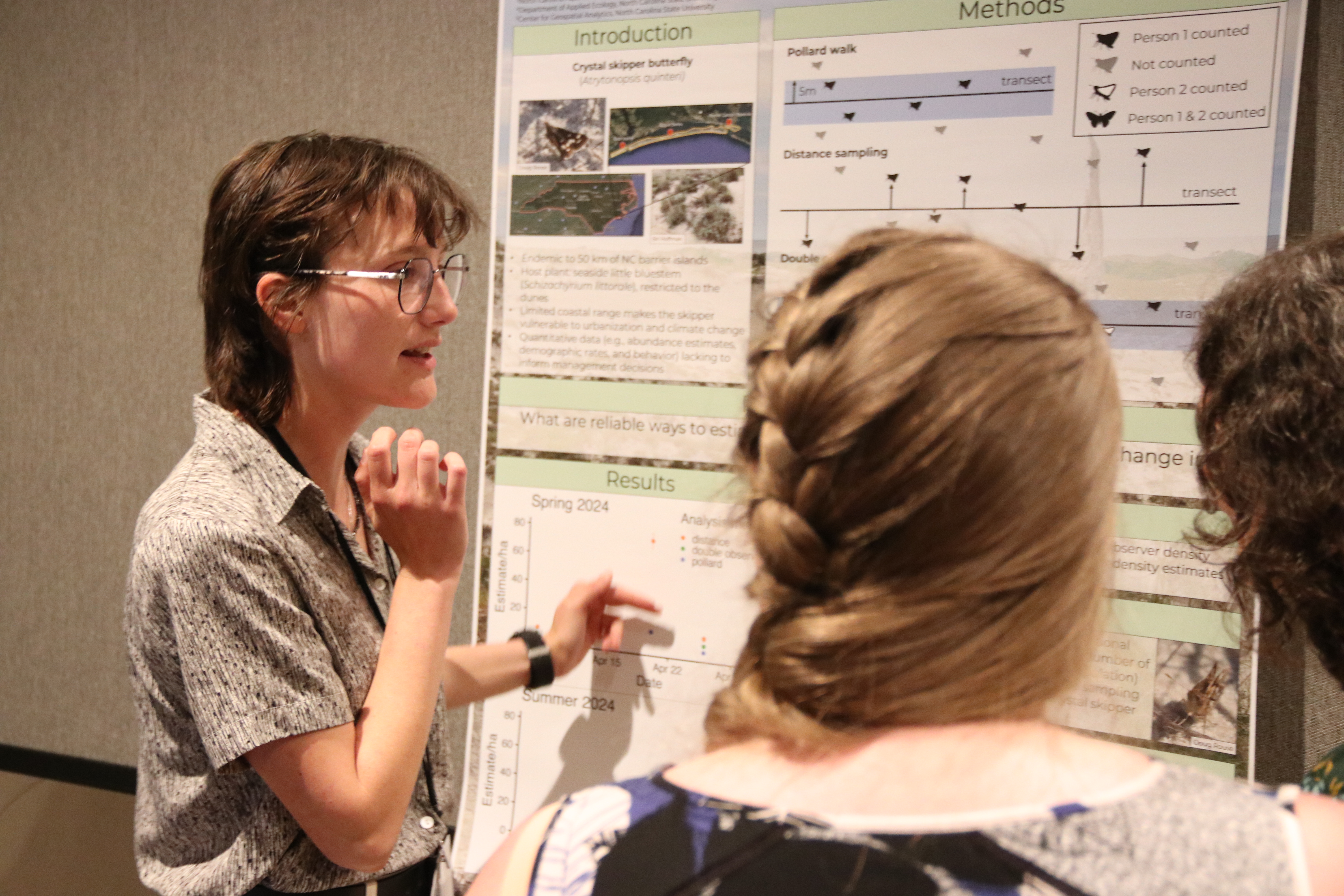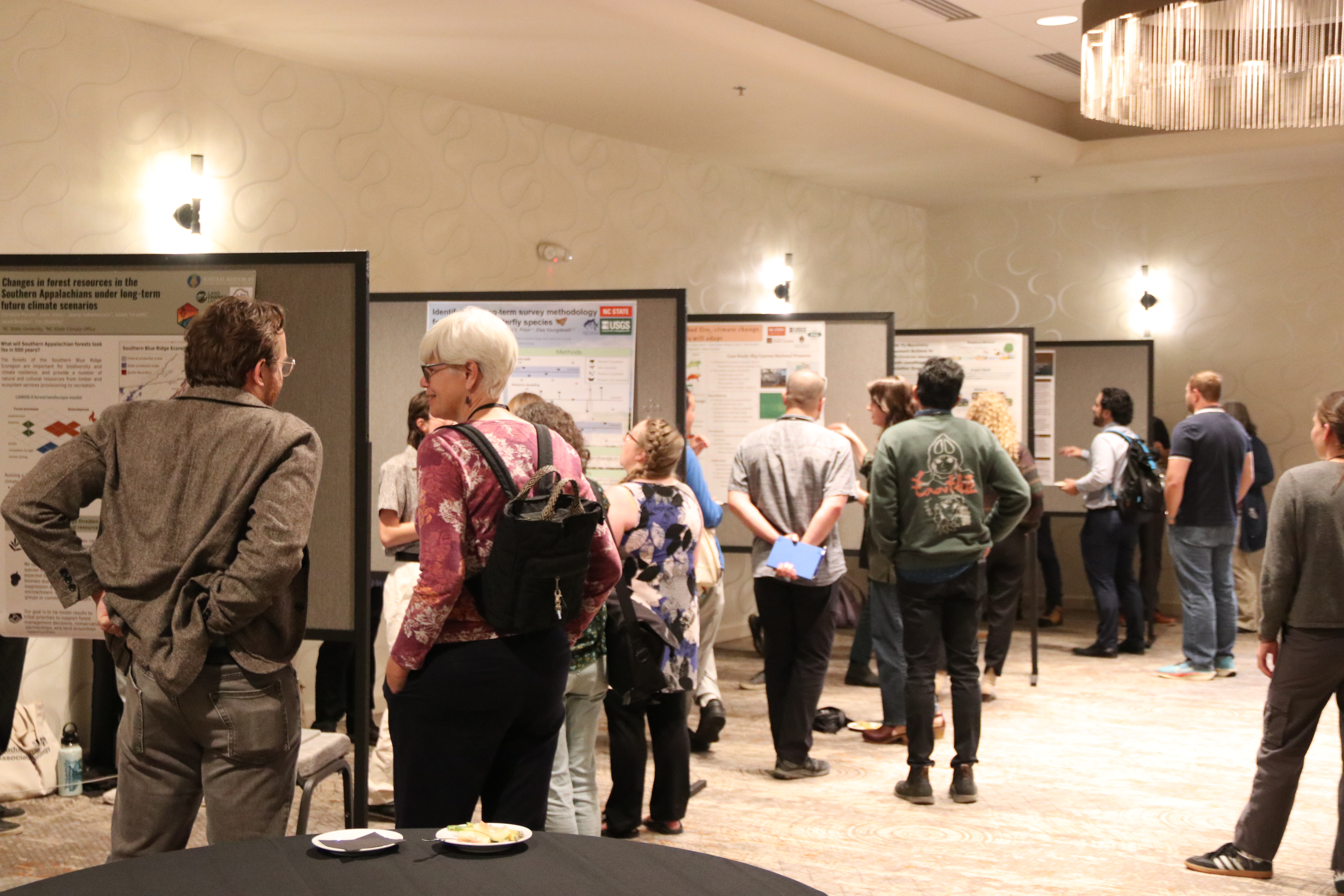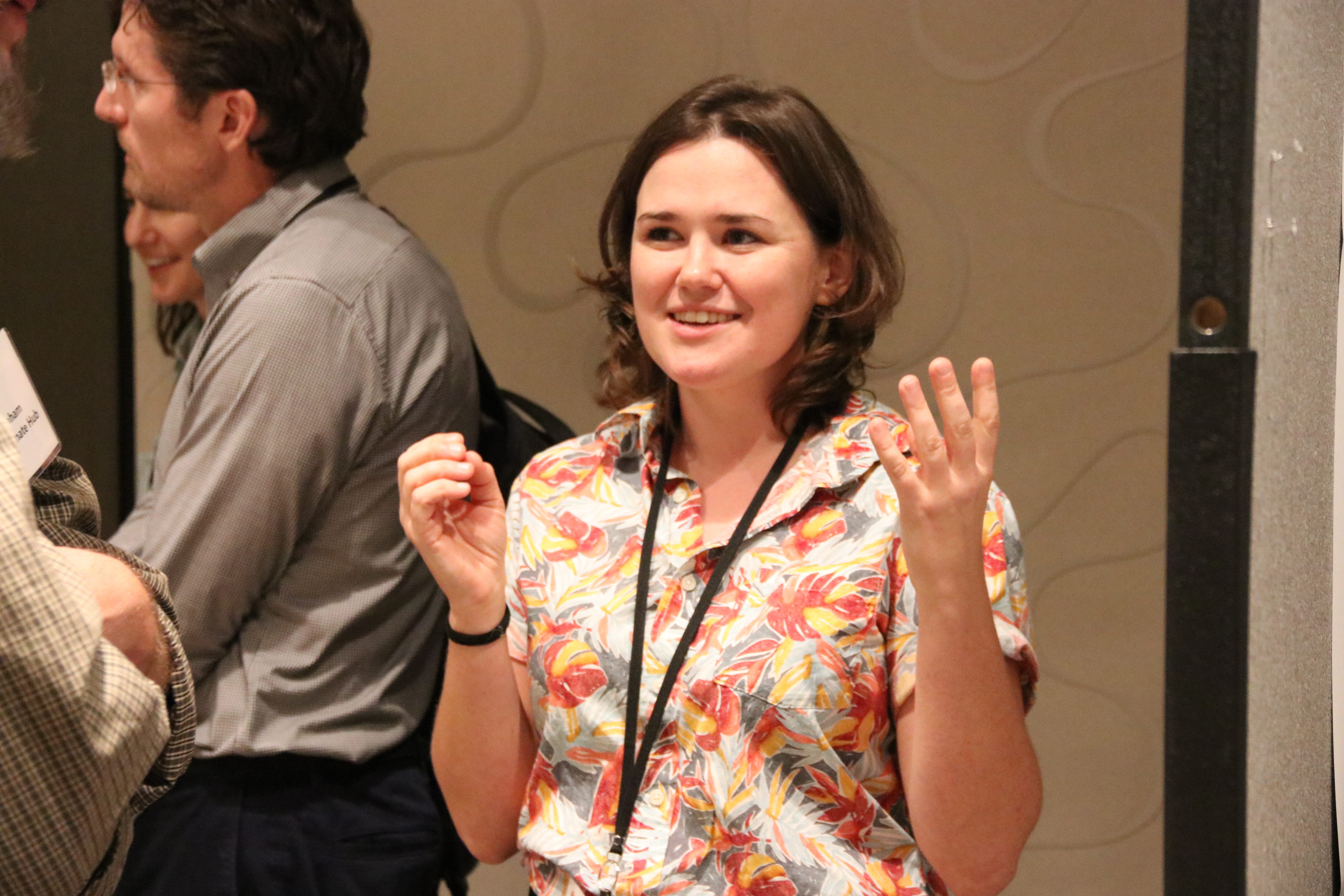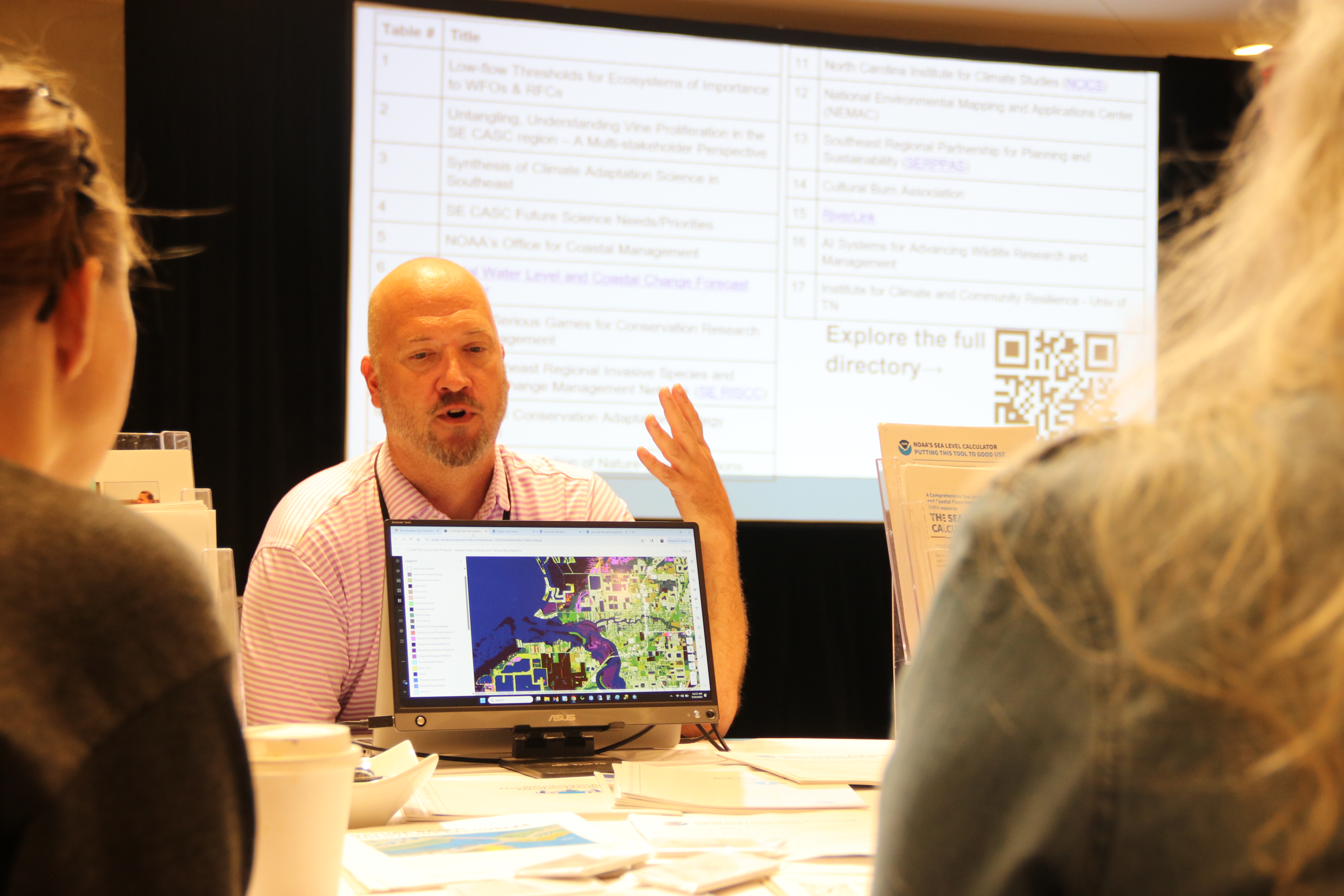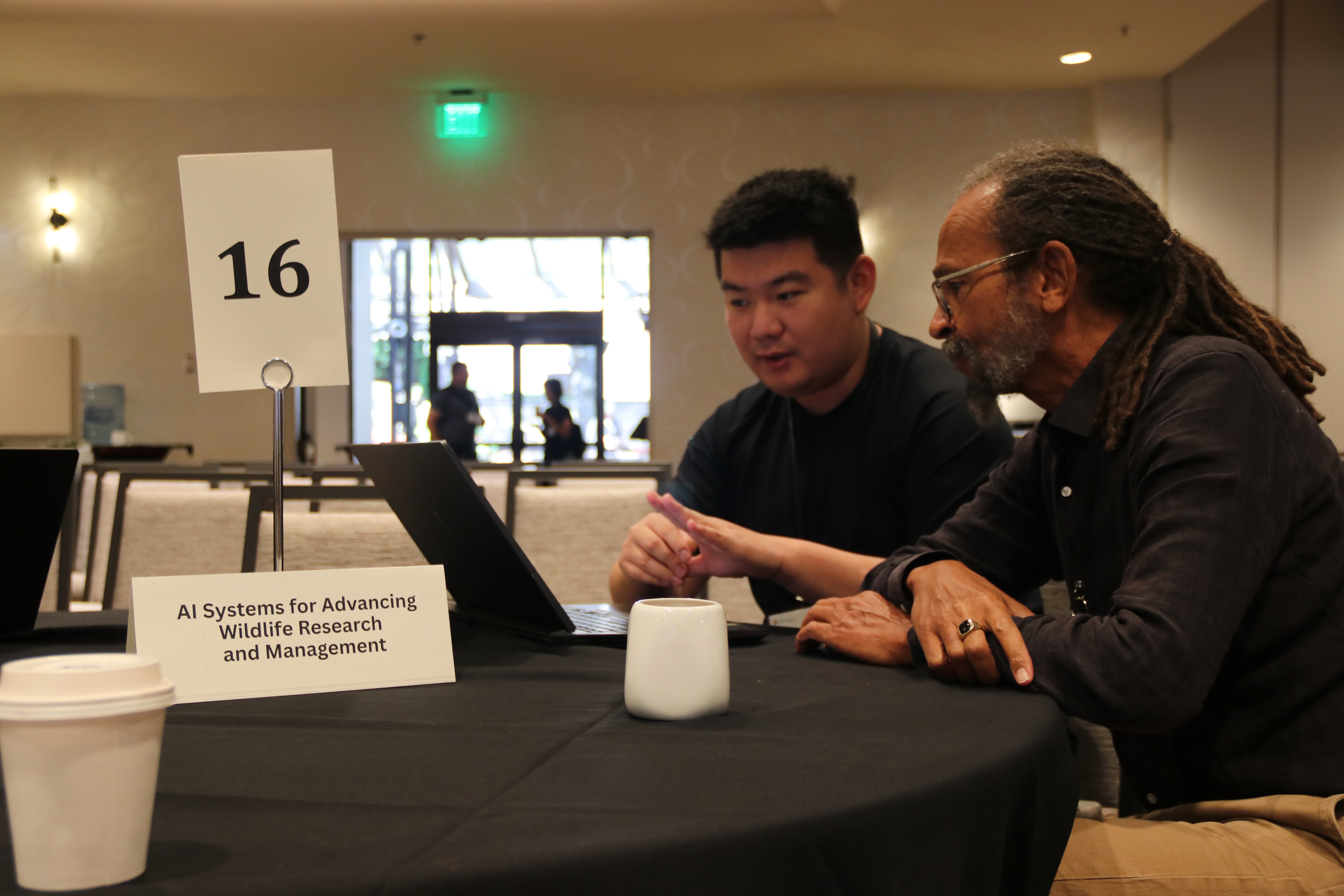Recapping the 2025 Regional Science Symposium
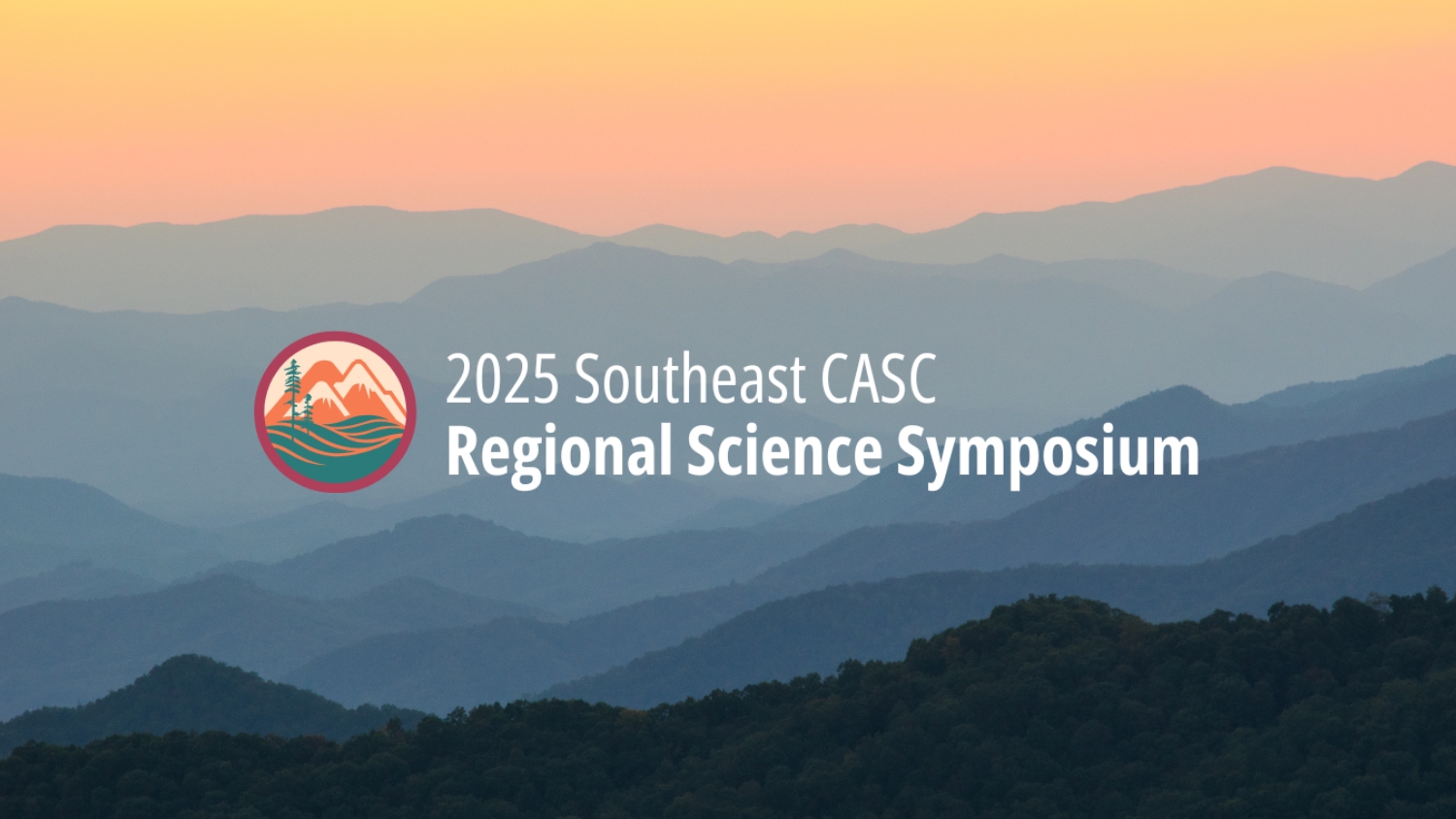
The 2025 Southeast CASC Regional Science Symposium on September 9-11, was an incredible opportunity for researchers, students, natural resource managers, and tribal staff to meet and learn from each other. Asheville, North Carolina served as the timely backdrop to convene around the central theme of “Adaptation After Extreme Events.”
Over the course of three days, we held seven panels, three breakout sessions, a poster session, a world cafe, four workshops, three field trips and many moments for connection and collaboration in between.
Panels
Our panels convened experts from across the Southeast to share their diverse perspectives on important topics facing the region today.
Projections of Change in the Southeast (session lead: Jaron Ming)
Jared Bowden (NC State Climate Office), Max Cawley (Museum of Life and Science), Georgina Sanchez (NC State University), Claire O’Dea (US Forest Service)
This panel set the stage around projected changes in the Southeast for climate, water, and ecosystems, focusing especially on scenarios of extreme events such as drought, storms, and heat waves.
Adaptation after Extreme Events (session leads: Legna Torres-Garcia and Cari Furiness)
Pedro Matos (University of Puerto Rico-Mayaguez), Michelle Moorman (FWS), Margaret Palmsten (USGS), Michael Cheek (NC Forest Service)
This panel presented examples of past extreme events and response actions including emerging technologies, case studies of new adaptation actions, and proposed methods.
Climate Action Planning (session lead: Katherine Smith)
Beth Stys (FWS), Jill Horwitz (Seminole Tribe of Florida), Janet Cakir (NPS), Brett Albanese (GA Department of Natural Resources), Mary Roderick (Land of Sky Regional Council), Nicole Angeli (VI Division of Fish & Wildlife)
This panel presented perspectives from various agencies on how they are incorporating climate information and adaptation actions into their organizational missions and meeting challenges to effective on-the-ground management.
Evaluation of Climate Adaptation Actions (session lead: Jen Cartwright)
Erin Seekamp (North Carolina State University), Jason Goldberg (FWS), Todd Jones-Farrand (FWS), Simeon Yurek (USGS Wetland and Aquatic Research Center), Lydia Olander/Katie Warnell (Duke University), Jessica Reilly-Moman (Island Institute)
This session explored methods of evaluating success of climate-adaptation strategies, discussed existing best practices that also have a climate-adaptation benefit, and weighed tradeoffs and metrics for nature-based solutions.
Global Change Research Fellows Lightning Talks / Early Career Roundtable (session lead: Michelle Jewell)
Laura Taylor (23-24), Henley Sartin (24-25), Christina Perella (22-23), Peizhe Li (current), Erin Eichenberger (22-23), Megan Carr (23-24)
Current and former Global Change Research Fellows presented on their conservation and climate decision focused research, experience in the fellowship program, and career paths.
Coordination Across Agencies and Scales to Implement Effective Landscape-level Conservation (session leads: Paul Armsworth and Rua Mordecai)
Louise Vaughn (Southeast Conservation Adaptation Strategy), Todd Schenk (Virginia Tech), Anna Smith (SC Dept of Natural Resources)
Wildlife resource management strategies can be more effective when coordinated across borders especially for species with large ranges of movement through their life cycles or with disparate habitat suitabilities. This panel presented collaborative projects of conservation actions across different scales including case studies at various stages.
Community Partners Panel (session lead: Dean Hardy)
Jenny Dissen (NCICS), Nicholas Shanahan (UT-Knoxville Institute for Climate & Community Resilience), Karin Rogers (UNC-Asheville NEMAC), Bridget Herring (City of Asheville)
Community partners discussed their recovery work in the Asheville area since Hurricane Helene, the resources required, and how resiliency has been or can be incorporated into those efforts.
Breakout Sessions
The breakout sessions featured presentations and discussions that delved into projects, research areas, and regional perspectives.
Breakout Session 1
- Human Dimensions of Climate Adaptation (session leads: Nils Peterson, Janet Cakir, Mallory Martin)
- Presenters: Ryan Jacobs (NC Wildlife Resources Commission); Charlynne Smith (Recreation Resources Service, NCSU); Paul Super (NPS)
- Climate Adaptation for Vulnerable Southeastern Species and Ecosystems (session leads: Becky Irwin, Marcel Bozas)
- Presenters: Mitch Eaton (USGS); Luke Etchison (NC Wildlife Resources Commission); Skylar Hopkins (NC State University); Marcel Bozas (Miccosukee Tribe of Indians of Florida)
- Prescribed and Wildland Fire Management (session leads: John Kupfer, Kevin Hiers)
- Presenters: Reetam Majumder (University of Arkansas); Fernando Garcia (NC State University); Lars Pomara (U.S. Forest Service); Joe O’Brien (U.S. Forest Service); Tommy Cabe, Josh Parris (Eastern Band of Cherokee Indians)
Breakout Session 2
- Partnership Coordination Across Scales to Implement Effective Landscape-level Conservation (session leads: Hailey Shanovich, Logan Benedict)
- Presenters: Kelly Homan (Auburn University), Legna Torres-Garcia (USGS, Hazards); Michelle Covi (Southeast Regional Partnership for Planning and Sustainability), Mike LaVoie (Eastern Band of Cherokee Indians)
- Regional Variability and Future Water Availability (session leads: Kasia Nikiel, Elliot Wickham)
- Presenters: Simeon Yurek (USGS Wetland and Aquatic Research Center), Andrew Joyner (TN State Climate Office), David Davis (NCSU Extension); Clay Chandler (Asheville Water Resources Department), Barrett Smith (NOAA)
- Interweaving Indigenous and Western Perspectives of Climate Adaptation (session leads: Caleb Hickman, Steph Courtney)
- Presenters: Caleb Hickman (Eastern Band of Cherokee Indians), Cherise Maples (Eastern Band of Cherokee Indians), Savannah Swinea (NC State University), Christina Perella (NC State University), Krystle Bowers (Seminole Tribe of Florida)
Breakout Session 3
- Movement of Native and Non-native Species (session leads: Brett Scheffers, Wes Daniel)
- Wes Daniel (USGS), Laura Thompson (USGS), Kelly Oten (NC State University), Mona Papes (UT Knoxville), Charles Martin (University of South Alabama)
- Nature-Based Solutions (session leads: Lydia Olander, Beth Stys)
- Greg Jennings (Jennings Environmental), Scott Covington (US Fish and Wildlife Service), Liz Fly (The Nature Conservancy of South Carolina), Lydia Olander & Katie Warnell (Duke University)
- Contrasting Climate Impacts on Regulated and Unregulated Rivers with Impacts to Downstream Resources (session leads: Micheal Allen, Simeon Yurek)
- Presenters: Mike Allen (University of Florida), Holden Harris (University of Florida), Simeon Yurek (USGS Wetland and Aquatic Research Center), Charlie Stillwell (USGS South Atlantic Water Science Center), Aaron Bunch (The Nature Conservancy of North Carolina), Mark Rogers (USGS Tennessee Cooperative Fishery Research Unit)
Poster Session
The poster session offered students, researchers, managers, and regional experts the opportunity to showcase their research and resources and share management-relevant tools. Find the full list of posters and their descriptions here.
World Cafe
The World Cafe featured 17 thematic and organizational tables around which participants had directed conversations and knowledge sharing.
Thematic tables
- Low-flow thresholds for ecosystems of importance to WFOs & RFCs
- Untangling, Understanding Vine Proliferation in the SE CASC region – A Multi-stakeholder Perspective
- Synthesis of Climate Adaptation Science in Southeast
- SE CASC Future Science Needs/Priorities
- Total Water Level and Coastal Change Forecast Viewer
- Use of Serious Games for Conservation Research and Engagement
- The Southeast Regional Invasive Species and Climate Change Management Network (SE RISCC)
- Improving evaluation of nature-based solutions
- AI Systems for Advancing Wildlife Research and Management
Organizational tables
- NOAA’s Office for Coastal Management
- Southeast Conservation Adaptation Strategy (SECAS)
- North Carolina Institute for Climate Studies (NCICS)
- National Environmental Mapping and Applications Center (NEMAC)
- Southeast Regional Partnership for Planning and Sustainability (SERPPAS)
- Cultural Burning Association
- RiverLink
- Institute for Climate and Community Resilience at the University of Tennessee
Workshops
The morning of our last day offered the chance for hands-on learning through four workshops.
- Resist, Accept, Direct (RAD) Training with Beth Stys and Michelle Moorman
- Introduction to Working with Tribal Nations with Casey and Sarah Thornbrugh
- Future of Climate Communications Workshop with Michelle Jewell, Mike DeLue, Caroline Gleason, and Anela Akana
- Playing FutureScape Serious Game with Rebecca Ward, Max Cawley, Ashton Merck, and Georgina Sanchez
Field Trips
Participants had the opportunity to go on any of the three offered field trips to engage with Asheville and the surrounding areas. Resilience and Restoration in the Qualla Boundary, homeland of the Eastern Band of Cherokee Indians hosted by several natural resources staff members of EBCI, a Guided Tour of the Asheville Museum of Science Exhibit: Our Changing World, or the Asheville Botanical Gardens: Stream Bank Repair and River Cane Propagation
Thank you!
Thank you to everyone who attended, presented, and/or engaged with the symposium. In the end, we had 175 attendees from across the Southeast, representing local, state, community and non-profit partners.
Also, thanks to the NC Biotechnology Center for their contribution towards making this event a success.
- Categories:

